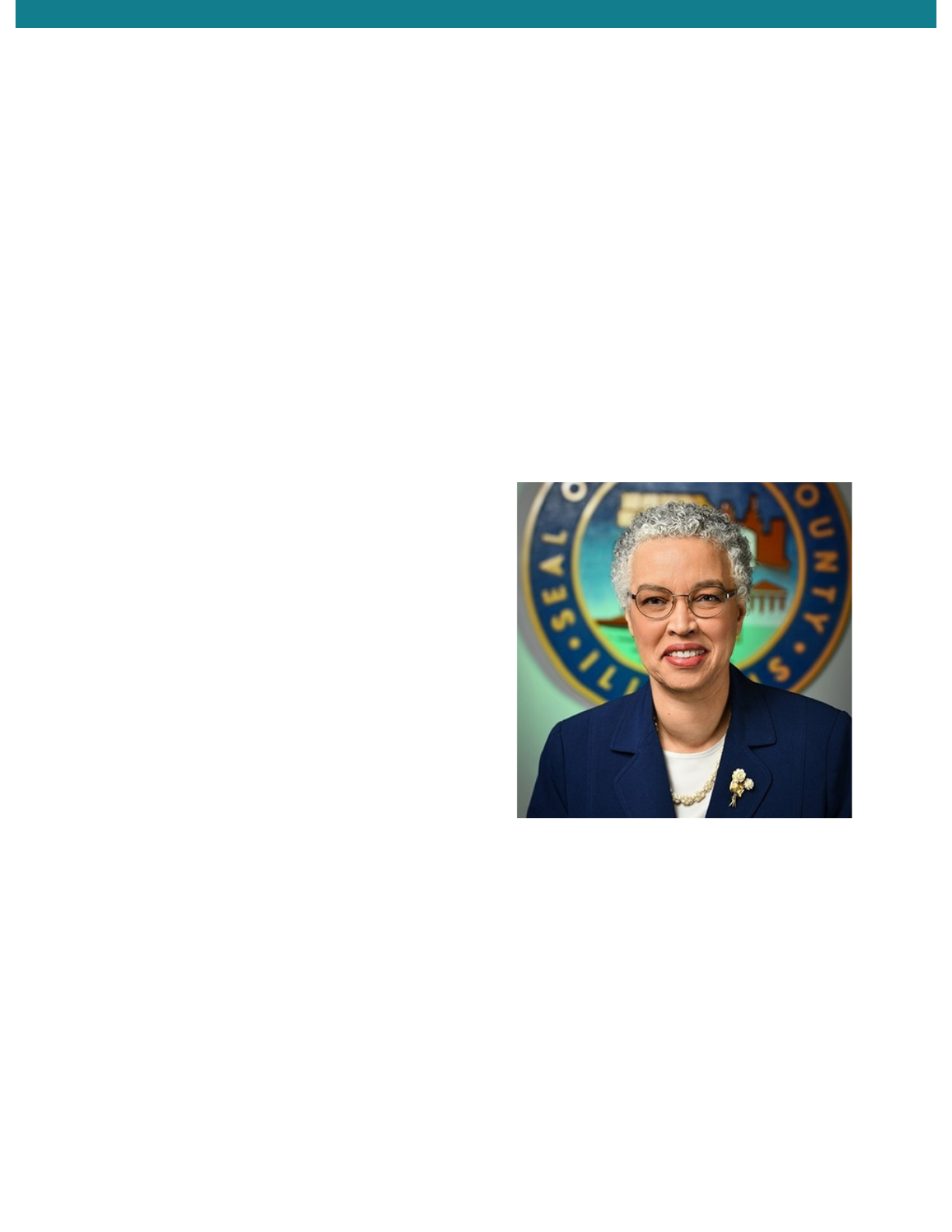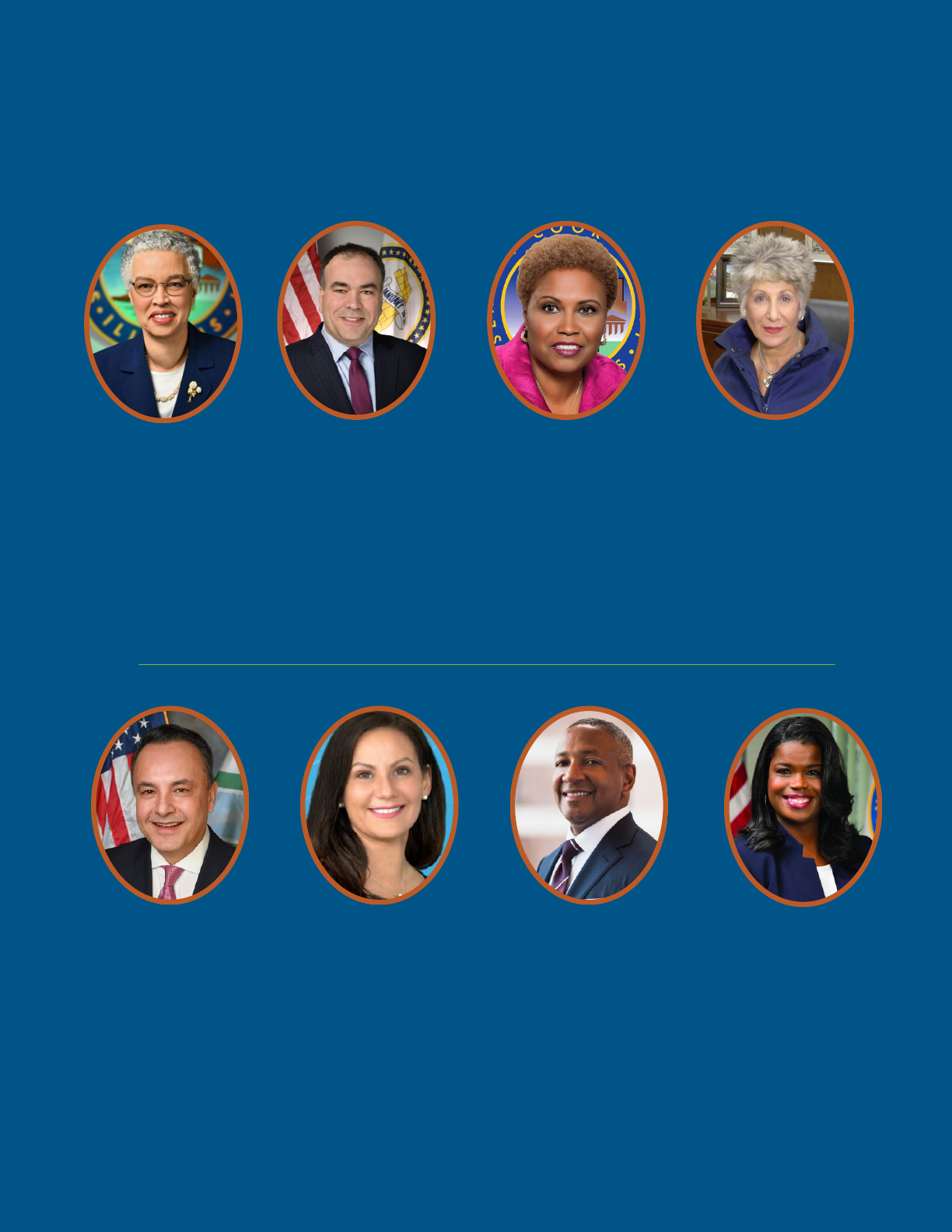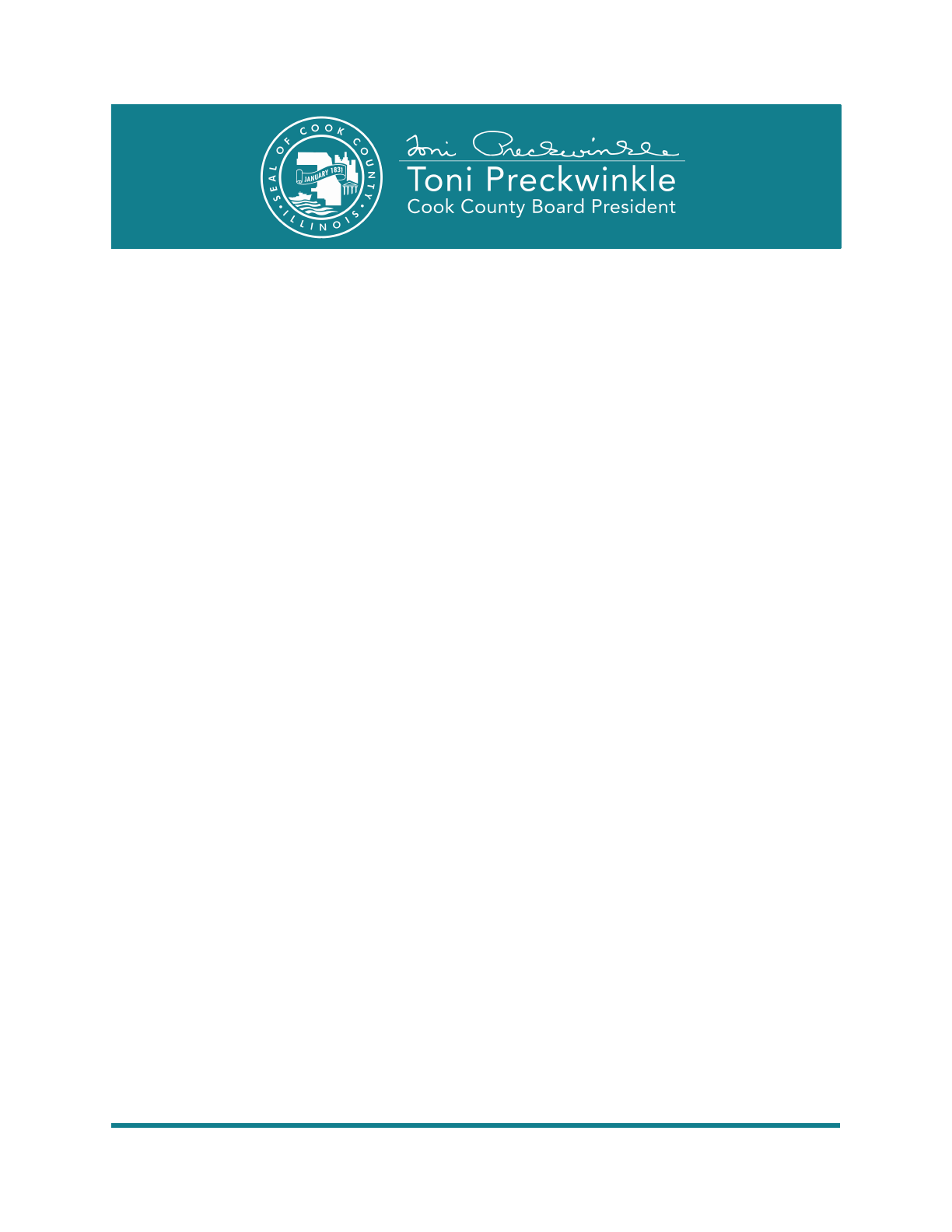
INTRODUCTION
TO REFORM
PROPERTY TAXES IN
COOK COUNTY
20
23
by the Cook County Property Tax (PTAX) Reform Group

Table of Contents
COOK COUNTY PTAX REFORM GROUP
Message from the President
01
Cook County’s Property Tax System
02
PTAX Reform Group
05
Guiding Principles
06
Addressing Key Issues
07
What’s Next
10

The Cook County Property Tax Reform Group
(PTAX) is the first working group of its kind. Built
across key County offices, the PTAX Reform
Group has taken an in-depth look at the way the
system has affected taxpayers and the
communities that need services to thrive.
In this report, we will provide the history of the
property tax system in Cook County, discuss how
it works, identify the challenges we face, and
begin to look at the key areas this group will focus
on to bring about the reforms needed to fully
transform the Cook County property tax system.
Reform will not happen overnight, but through
intensive review and collaboration, the PTAX
Reform Group will pursue the steps necessary to
get us to transformative, equitable solutions.
Message from the President
"The property tax system impacts every single person
who lives or works in Cook County. Working together
in a collaborative, data-driven way, we can build and
sustain an equitable, fair system that allows all our
communities to grow and fund our most vital
services."
COOK COUNTY PTAX REFORM GROUP
1

Property taxes are useful as a revenue source for governments and the residents they serve; they
reduce the reliance on more regressive taxes, such as the sales tax, and offer a relatively predictable
source of revenue. Property taxes are designed to be progressive taxes, as they “tend to take a
relatively smaller share of income as incomes fall” (Langley & Youngman, 2021).
Unfortunately, studies have shown that some property assessment practices across the United States
create regressive, inequitable systems in which “lower-priced properties are assessed at a higher
proportion of their sale prices than are higher-priced properties” (Berry, 2021).
In a groundbreaking 2017 investigation, researchers with the Chicago Tribune and ProPublica found
that “at least $2.2 billion in property taxes was shifted from undervalued Chicago homes onto
overvalued ones between 2011 and 2015”(Grotto, 2017). These regressive assessments can lead to
“financial breaks to homeowners who are well-off while punishing those who have the least,
particularly people living in minority communities” (Grotto, 2017).
The investigation also estimated that Cook County’s commercial valuation and assessment processes
created a regressive system where “undervaluing expensive downtown buildings while overvaluing
small businesses in poorer neighborhoods” (Grotto & Kambhampati, 2017) was a standard practice.
Assessments, however, are not the only part of the system that create potential inequities. Local
services, such as schools and libraries are funded by property taxes which are based on the value of
nearby properties. Communities with higher “property tax rates generally have low home values, which
drive up the tax rate needed to raise enough revenue” (Kingson, 2023). This situation results in higher
tax rates for people living in areas with lower-value properties and creates potential inequities for
communities which struggle to provide equitable access to services.
Higher tax rates discourage economic investment, even pushing existing businesses out of Cook
County to other communities. The loss of commercial properties and investment further reduces the
tax base and raises the tax rate. This can result in “fewer people paying property taxes, putting even
more upward pressure on the already enormous tax bills for those who do” (Toner, 2018).
This economic disinvestment spiral is primarily felt in the south suburbs, where some communities
have tax rates 400 to 500 percent higher than other communities in the County. For example, the City
of Chicago has a tax rate of 7%, while Park Forest has a tax rate of 41%, a 485% difference. In another
example, “composite property tax rates faced by Dolton homeowners are now more than triple those
in Chicago” (Toner, 2018).
COOK COUNTY PTAX REFORM GROUP
Cook County’s Property Tax System:
Its benefits and pitfalls
2
1
2
3
5
6
7
8
4

The system’s operation is hard to understand and changes due to assessments and appeals
are confusing, which creates instability for the local economy.
People who live in areas with lower-value properties and economic disinvestment are unfairly
saddled by astronomical tax burdens.
Residents and commercial property owners alike share a common dislike of Cook County’s
property tax system. The County’s system is one of the most complex in the nation and has been
described as “convoluted and opaque” (Grotto, 2017). General criticism and analysis typically
concentrate on two issues:
County residents’ confidence in the property tax system is low. Leaders in the property tax system
have recognized these challenges and believe that the system needs reform.
Based on the systems’ current state, President Preckwinkle called upon all Cook County elected
officials in the property tax system to confront the issues and implement change. This reform
group was created to work collaboratively on effective change throughout the system.
The PTAX Reform Group’s agreed upon mission is to ensure that the property assessment and tax
system produces predictable, accurate, fair, and equitable results in a timely and efficient manner.
Reforming the property tax system will allow us to address racial and socioeconomic inequities
across the County and provide transparency and stability in how we finance the government
services and programs residents rely on for robust, healthy lives.
COOK COUNTY PTAX REFORM GROUP
Cook County’s Property Tax System:
A Call for Reform
3
9

COOK COUNTY PTAX REFORM GROUP
Cook County’s property tax system is
one of the largest and most complex
in the nation. Here’s how it works.
Four separately elected offices make up the property tax system, which collects and distributes more
than $16 billion from people who own over 1.8 million properties (Cook County Treasurer, 2023).
The County sets a value for all the property, settles disputes through a system of appeals, sets the tax
rate for each area, sends out the tax bills, and provides each taxing district with the money they are
owed. Taxing districts such as local schools and municipalities set the levy or funding needs to provide
essential services.
Cook County collects and distributes funds to “588 individual taxing districts” (Cook County Treasurer,
2020), in addition to “more than 1,400 taxing agencies in Cook County” (Cook County Clerk, 2022).
Multiple taxing districts serve each property. These taxing districts include municipalities, school
districts, park districts, and others which provide a wealth of services that communities require. The
services provided to residents in these taxing districts support schools, police and fire protection,
health services, housing, roads, mosquito abatement, recreation, and more. The taxing districts for
each property are printed on a property owner’s second installment tax bill.
4
10
1211

PTAX Reform Group
Fritz Kaegi
Cook County Assessor
The mission of the Cook County
Assessor’s Office is deliver
accurate and transparent
assessments of all residential
and commercial properties.
Maria Pappas
Cook County Treasurer
The Cook County Treasurer is
responsible for collecting,
safeguarding, investing, and
distributing property tax funds.
Karen Yarbrough
Cook County Clerk
The Cook County Clerk is
responsible for maintaining
and providing vital records,
various aspects of the real
estate tax process, receiving
and making available to the
public statements of economic
interest.
Kim Foxx
Cook County State's Attorney
The State’s Attorney Office
works to uphold public safety
through the fair and efficient
administration of justice.
Samantha Steele
Commissioner
Board of Review
District 2
George Cardenas
Commissioner
Board of Review
District 1
Larry Rogers, Jr.
Commissioner
Board of Review
District 3
The Board of Review’s mission is to provide an efficient and accessible service to all property owners and
to review overvaluation assessment appeals with careful consideration to ensure a fair and impartial
judgment.
Toni Preckwinkle
Cook County President
5

LONG-TERM IMPACT
The complexity of reforming the property tax system requires a
comprehensive approach and long-term commitment.
TRANSPARENCY & ACCOUNTABILITY
Annual reports evaluate overall performance of the property tax system.
Research and other work products will be publicly available.
STAKEHOLDER ENGAGEMENT
For each set of reforms, targeted engagement plan will be implemented for
relevant stakeholders.
Mission
DATA-DRIVEN
Objective, third-party research, data, and shared fact sets based on industry
standards and best practices will guide the research and ultimately the policy
recommendations.
PTAX Reform Group Guiding Principles
To ensure the property assessment and tax system
produces predictable, accurate, fair, and equitable
results in a timely and efficient manner.
COLLABORATION
All relevant County offices are included; the staff working group meets
regularly to track progress, discuss research findings, and align on reform
recommendations.
COOK COUNTY PTAX REFORM GROUP
6

The PTAX Reform Group has identified the most significant hurdles to true reform and
outlined the following areas for further research and action, divided into immediate, County-
based actions and those requiring engagement with state legislators and other
stakeholders.
Inequities in the System
There continues to be the potential for regressivity in the Cook County property tax system,
and the group is committed to researching and implementing policy changes to correct it.
High Number of Appeals
Cook County remains a significant outlier regarding the number of appeals filed against the
initial assessments. Nationally, around 5% of the initial assessments are appealed (Nesbit,
2023). In Cook County, the figure is closer to 30% (Eng, 2023). Every property owner
deserves the right to appeal their assessment, but this departure from national norms may
contribute to inequities, reflects differing approaches within the system, and is time-
consuming and costly for property owners and the County.
Differing Systems of Commercial Property Valuation
Participants in the current system have differing views on how to value commercial
property, and Cook County should have a common approach across the board.
Access to Public Information
There are multiple actors and steps in the property tax system. The public, property owners,
and taxing districts need a clear understanding of the process and a way to receive answers
to their questions promptly and clearly. The County will recommend and make changes to
better inform all stakeholders.
An Integrated Data Management System
The County has committed to creating a modern data management system so that all
offices will be on a common platform and can access shared data for each property and
taxing district. Some of the components of that system have been put in place. Others are in
process. The working group will manage the completion of the process.
COOK COUNTY PTAX REFORM GROUP
Addressing Key Issues Within Cook
County's Property Tax System
13 14
7

Creating Effective Exemptions and Incentives
Exemptions are designed to provide tax relief for a residential property owner category (e.g.
homeowners, the elderly, or veterans). Incentives are designed to “encourage industrial and
commercial development in areas of the county which are experiencing severe economic
stagnation” (Cook County Assessor, 2023). Both serve an essential purpose. These tools,
however, result in the local tax burden shifting from those who receive the benefit to everyone
else. This shift can be problematic in smaller taxing districts or places where disinvestment has
occurred. The working group has retained the Chicago Metropolitan Agency for Planning
(CMAP) and the University of Illinois at Chicago to comprehensively analyze these tools' social
and economic costs and benefits. This will allow the group to learn how to deploy these tools
strategically to improve the system and achieve its mission.
Developing Performance Measures
Because of the many offices involved in the property tax system, a comprehensive, annual audit
should be a standard operating procedure. Therefore, the Cook County Office of the President
will provide annual reports on the property tax system, including the results of sales ratio
studies, which are the accepted measure of assessment performance in the industry. These
reports will also address progress in meeting the various objectives of the PTAX Reform Group.
Reducing the Reliance on Property Taxes
Illinois taxing districts rely more on property taxes to pay for its services more than in any other
state in the nation, except New Jersey (Civic Federation, 2022). While the property tax
assessment process determines the share of taxes each property owner pays, the amount paid
depends on how much each taxing district requests annually. Reducing the requested tax levies
will mean the taxing districts will have to rely on other sources of revenue or an increased use of
similar shared resources. The PTAX Reform Group will examine and recommend practical ways
of reducing the reliance on property taxes while still adequately funding critical public services.
These issues will be approached in multiple phases and engage stakeholders and community
members to ensure all voices are heard to achieve the goal of an equitable and fair system.
COOK COUNTY PTAX REFORM GROUP
Addressing Key Issues Within Cook
County's Property Tax System
15
16
8

Cook County PTAX Reform Group Decision-Making Framework
The PTAX Reform Group, working with the Civic Consulting Alliance (CCA), developed a
decision-making framework that leverages a data-driven approach to recommend policy
changes and implement reforms. The framework also includes ongoing review and
assessment, ensuring the PTAX Reform Group is using an equity lens to make progress in a
strategic and sustainable way.
COOK COUNTY PTAX REFORM GROUP
Addressing Key Issues Within Cook
County's Property Tax System
Review, Assess, Repeat
9

What's Next
COOK COUNTY PTAX REFORM GROUP
PTAX Reform Group Research Partners
The Cook County Office of the President has engaged academic and public policy leaders to
perform research and analysis that will be the foundation for the PTAX Reform Group’s
recommendations and reform efforts.
10

1. Langley, Adam, and Joan Youngman. Property Tax Relief for Homeowners. Lincoln
Institute of Land Policy, 2021.
2. Berry, Chris. “Reassessing the Property Tax.” The University of Chicago, 7 Feb. 2021,
cpb-us-w2.wpmucdn.com/voices.uchicago.edu/dist/6/2330/files/2019/04Berry-
Reassessing-the-Property-Tax-3121.pdf.
3. Grotto, Jason. “The Tax Divide: An Era of Errors.” The Tax Divide - Chicago Tribune, 10
June 2017, apps.chicagotribune.com/news/watchdog/cook-county-property-tax-
divide/houlihan.html.
4. Grotto, Jason. “The Tax Divide: An Era of Errors.” The Tax Divide - Chicago Tribune, 10
June 2017, apps.chicagotribune.com/news/watchdog/cook-county-property-tax-
divide/houlihan.html.
5. Kambhampati, Sandhya, and Jason Grotto. “How the Cook county Assessor Failed
Taxpayers.” ProPublica Illinois, 7 Dec. 2017, features.propublica.org/the-tax-divide/cook-
county-commercial-and-industrial-property-tax assessments/.
6. Kingson, Jennifer. “City Tax Rates Struggle to Keep up with Rising Home Values -
Axios.” Axios, 22 Aug. 2023, www.axios.com/2023/08/22/tax-rates-home-values.
7. Toner , Casey. “How Dolton, Illinois Reflects America’s Changing Suburbs in 2018.”
Better Government Association, 12 Nov. 2018, projects.bettergov.org/2018/dolton/.
8. Toner , Casey. “How Dolton, Illinois Reflects America’s Changing Suburbs in 2018.”
Better Government Association, 12 Nov. 2018, projects.bettergov.org/2018/dolton/.
9. Grotto, Jason. “The Tax Divide: An Era of Errors.” The Tax Divide - Chicago Tribune, 10
June 2017, apps.chicagotribune.com/news/watchdog/cook-county-property-tax-
divide/houlihan.html.
10. Pappas, Maria. “Tax Year 2021 Bill Analysis.” Cook County Treasurer, 1 Dec. 2022,
www.cookcountytreasurer.com/pdfs/taxbillanalysisandstatistics/taxyear2021analysis.pdf.
11. Pappas, Maria. “The Pappas Study - Cook County Treasurer.” Cook County Treasurer,
Oct. 2020, www.cookcountytreasurer.com/pdfs/taxstudy/thepappaspropertytaxstudy.pdf.
Works Cited
11

12. Yarbrough, Karen. “2021 Cook County Tax Rates Release.” Cook County Clerk, 5
Dec. 2022. www.cookcountyclerkil.gov/sites/default/files/pdfs/2021%20Tax%20Rate
%20Report.pdf.
13. Nesbit, Josephine. “Property Tax Assessment: What It Is and How to Appeal - U.S.
News Real ...” U.S. News & World Report , 6 Apr. 2023, realestate.usnews.com/real-
estate/articles/what-is-a-property-tax-assessment.
14. Eng, Monica. “How Cook County is Trying to Improve Its Property Assessments.”
Axios Chicago, 25 May 2023, www.axios.com/local/chicago/2023/05/25/cook-county-
property-tax-assessment-errors.
15. Kaegi, Fritz. “Incentives & Special Properties.” Incentives & Special Properties | Cook
County Assessor’s Office, 2023, www.cookcountyassessor.com/incentives-special-
properties.
16. Federation, Civic. “New Report: Illinois Property Taxes among Highest in Nation.”
New Report: Illinois Property Taxes Among Highest in Nation | Civic Federation, 22
Sept. 2022, www.civicfed.org/civic-federation/blog/new-report-illinois-property-taxes-
among-highest-nation#:~:text=Illinois%20came%20in%20second%20to,in%20
New%20Jersey%20paid%202.21%25.
Works Cited
12

Tara Stamps, District 1
Dennis Deer, District 2
Bill Lowry, District 3
Stanley Moore, District 4
Monica Gordon, District 5
Donna Miller, District 6
Alma E. Anaya, District 7
Anthony Quezada, District 8
Maggie Trevor, District 9
Bridget Gainer, District 10
John P. Daley, District 11
Bridget Degnen, District 12
Josina Morita, District 13
Scott R. Britton, District 14
Kevin B. Morrison, District 15
Frank J. Aguilar, District 16
Sean M. Morrison, District 17
Board of Commissioners
September 2023
